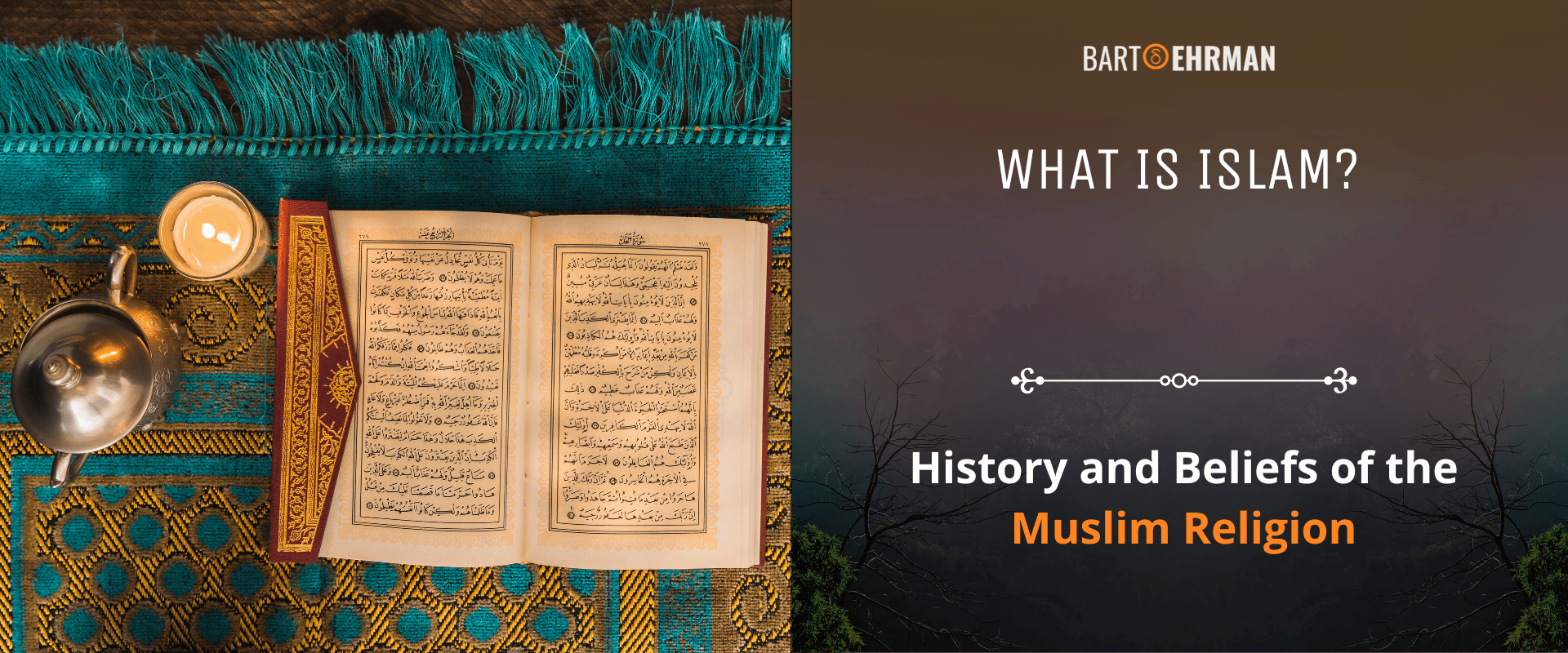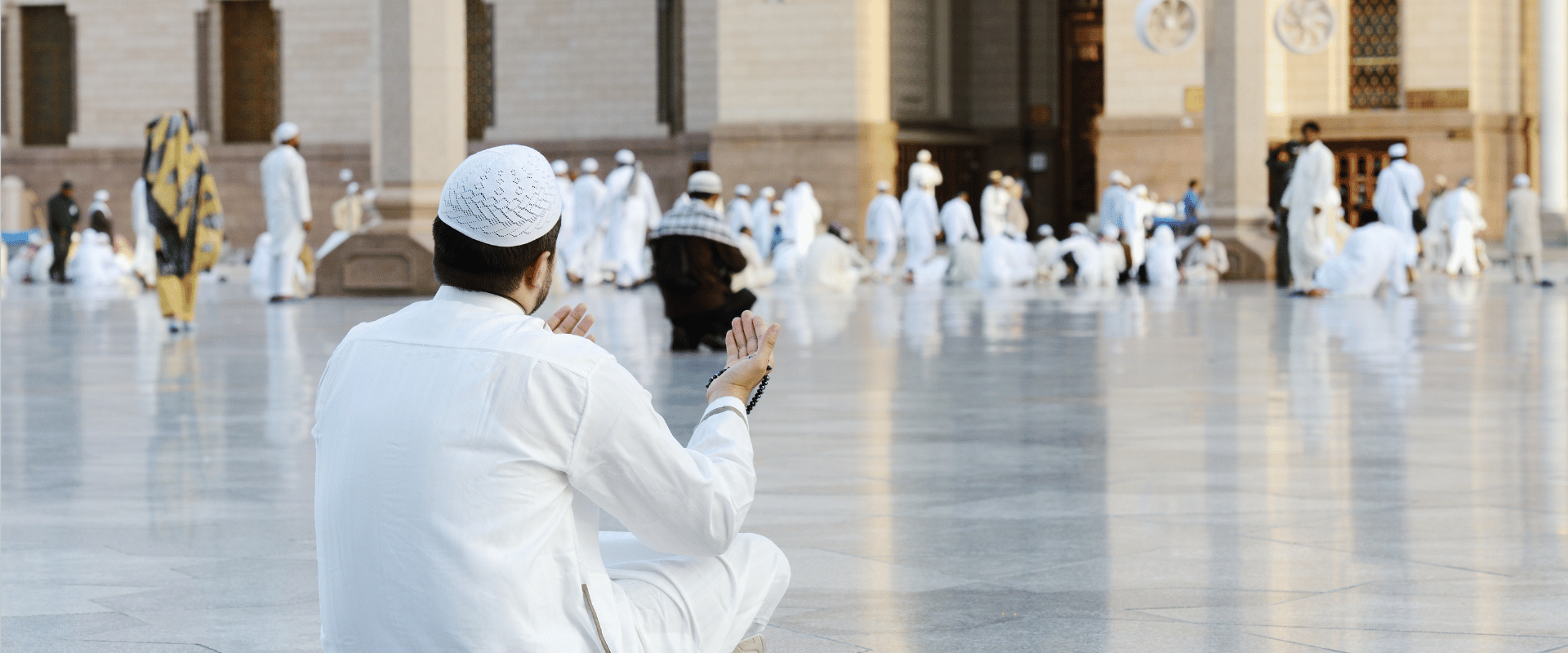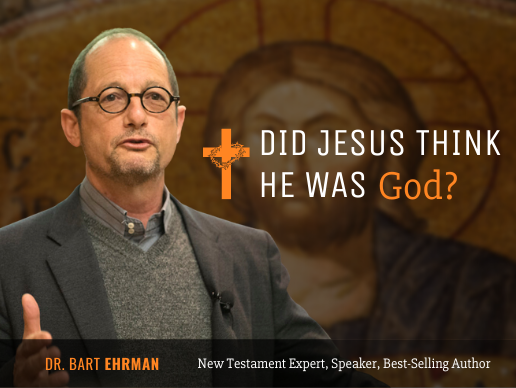What is Islam? History and Beliefs of the Muslim Religion

Written by Marko Marina, Ph.D.
Author | Historian | BE Contributor
Verified! See our editorial guidelines
Disclaimer: The views and opinions expressed in this article belong to the author and do not necessarily match my own. - Dr. Bart D. Ehrman
From the vibrant cities of Indonesia to the hushed corners of historic mosques, the call to prayer resonates across the globe – a testament to the enduring power and profound influence of Islam.
What is Islam? It’s one of the world's major monotheistic religions, deeply shaping the course of human civilization through its comprehensive system of belief and practice. This faith tradition guides its adherents in matters both spiritual and temporal, offering a path that intertwines the divine with the daily aspects of life.
The origins of Islam are inextricably bound to the life of Prophet Muhammad, a merchant in 7th-century Mecca (modern-day Saudi Arabia). Muhammad's revelations formed the basis of the Quran, believed by Muslims to be the verbatim word of God.
This text along with the recorded teachings and actions of the Prophet (known as the Sunnah), form the basis of Islamic belief, ethics, and law. This article delves into the core tenets of Islam, exploring its historical origins, foundational texts, and its enduring significance in shaping the lives of millions worldwide.

What is Islam? An Overview of Islam’s History
To answer the question “What is Islam?”, one must delve into the origins of this global religion, which begins with the life of its founder, Prophet Muhammad. Born in Mecca around 570 C.E., Muhammad was brought up in a society riddled with socio-political strife and spiritual void.
At the age of 40, he began to receive what he interpreted as revelations from God through the angel Gabriel. These revelations, which continued for the remainder of his life, were later compiled into the Quran, the holy book of Islam.
William M. Watt encapsulates the essence of his role, stating, "He was undoubtedly a religious leader; but for him, religion was the total response of his personality to the total situation in which he found himself. He was responding not merely to what the occidental would call the religious and intellectual aspects of the situation, but also to the economic, social, and political pressures to which contemporary Mecca was subject."
This insight seeks to capture the multifaceted leadership of Muhammad, underscoring that Muhammad's influence extended beyond the purely religious realm.
Watt highlighted that Muhammad wasn’t only a religious figure but also a military and political leader. He navigated the complex socio-political landscape of contemporary Mecca, addressing not only spiritual and intellectual needs but also responding to the economic, social, and political challenges of the time.
The Quran revealed to Muhammad, served as a moral and ethical guide, advocating for monotheism, social justice, and ethical conduct. It’s important to note that some scholars speculate that in the earliest years, Islam had not yet developed as a distinct religion but was more of a monotheistic revival movement advocating for a strong monotheistic stance.
Alongside the Quran, Muhammad's teachings and practices (Sunnah), documented in Hadiths, provided practical examples of Islamic principles in action.
The early Islamic community, or Ummah, was established in Medina (modern-day Saudi Arabia), where Muhammad migrated in 622 C.E., an event known as the Hijra, marking the beginning of the Islamic calendar.
Here, the Muslim community rapidly expanded, uniting the tribes of Arabia under the banner of Islamic religion through a combination of conversion, negotiation, and, at times, military campaigns.
The spread of Islam (made through military campaigns) during and after Muhammad’s lifetime was remarkable for its speed and scale. By the end of the 7th century, Islamic religion had spread to the Levant, North Africa, and parts of the Byzantine and Persian empires, laying the groundwork for a civilization that would make significant contributions to art, science, philosophy, and governance.
Behind the victories made on the battlefield stood a strong religious perspective. As Chase F. Robinson explains:
“What held the polity together was thus both belief in the next world and confidence in this one because of the rewards God offered through the spread of His dominion that is, conquest. ‘The earth belongs to God, Who bequeaths it to whom He wishes amongst His servants’, as Q 7:128 puts it. The early Islamic polity survived in large part because it conquered.”
Understanding the origins of Islam, from the life of Prophet Muhammad to the early expansion of the Muslim community, is crucial to comprehending the depth and breadth of the Muslim religion.
Islam, as ignited by Muhammad, isn’t merely a set of doctrinal beliefs but a comprehensive worldview that addresses all aspects of human existence.
What is Islam? Core Beliefs and Practices
What do Muslims believe? This question is central to understanding Islam, a religion that delineates its core tenets and practices through the Five Pillars. These pillars form the foundation of a Muslim's faith and practices, encapsulating the essence of Islam's teachings. Let’s take a closer look at each of these pillars!
#1 Shahada
The Shahada is the Islamic declaration of faith, stating "There is no god but God, and Muhammad is the messenger of God." This confession is a fundamental expression of Islamic monotheism, affirming the oneness of God and Muhammad's role as His prophet.
David Waines aptly notes the importance of the shahada: “These phrases sum up the prophetic-revelatory event in Islam, and the rituals themselves draw their essential meaning from it, that is, as the performance of obedient acts of service ('ibadah) to and worship of the One God.”
#2 Salah
Salah refers to the five daily prayers performed at specific times throughout the day: at dawn, noon, mid-afternoon, sunset, and evening.
These prayers are a direct link between the worshiper and God, emphasizing discipline, spirituality, and closeness to the divine. The Salah is both a personal communication with God and a communal practice that connects all Muslims.
Did You Know?
In the 7th and 8th centuries, Arab forces launched several ambitious attempts to conquer Constantinople, the capital of the Byzantine Empire, but were repeatedly repelled, largely due to a formidable and mysterious weapon known as Greek fire.
This incendiary weapon, which could continue burning even on water, played a crucial role in the Byzantines' naval defense, preventing the Arab fleets from breaching the city's formidable sea walls. The exact composition of Greek fire has been lost to history, making it one of the medieval world’s most intriguing military secrets.
Initially, Muslims prayed while facing Jerusalem, a practice reflecting Islam's roots in the same monotheistic tradition as Judaism and Christianity. However, this direction of prayer (Qibla) changed in the second year after the Hijra, the migration to Medina, around 624 C.E.
According to the tradition, God commanded Muhammad to turn towards the Kaaba in Mecca, Islam's holiest site, during prayer. This shift was significant, not only orienting the physical direction of Muslim prayers but also symbolically distinguishing Islam's unique identity.
#3 Zakat (Charity)
Zakat is a form of almsgiving and one of the Five Pillars of Islam. It requires Muslims to donate a fixed portion of their wealth (typically 2.5% of their savings) to those in need, promoting a sense of responsibility towards the community and helping to reduce poverty and inequality.
This pillar of the Muslim religion is deeply rooted in both the Quran and the teachings of Prophet Muhammad. The Quran explicitly commands Muslims to practice Zakat as a means of purifying their wealth and supporting those in need.
Numerous verses emphasize its importance, such as Surah Al-Baqarah (2:110), which states, "Establish prayer and pay alms tax. Whatever good you send forth for yourselves, you will certainly find its reward˺ with Allah. Surely Allah is All-Seeing of what you do."
Moreover, Muhammad’s teachings reinforce the significance of Zakat in Islam. Through his Hadiths (sayings and actions), Muhammad clarified the practical aspects of Zakat, including the types of wealth subject to it, the rate at which it should be given, and the categories of beneficiaries.
#4 Sawm (Fasting during Ramadan)
Sawm is the practice of fasting during the month of Ramadan, the ninth month of the Islamic lunar calendar, lasting 29 or 30 days based on the lunar cycle. Muslims are required to abstain from eating, drinking, smoking, and sinful behavior from dawn until sunset.
This period of fasting isn't merely about physical restraint but is also a time for spiritual reflection, increased devotion, and reading of the Quran.
The fast is an expression of self-discipline, empathy for the less fortunate, and submission to God's will. By refraining from these basic needs during daylight hours, Muslims foster a deeper sense of spiritual mindfulness and gratitude, while also uniting with their global community through a shared act of worship.
#5 Hajj (Pilgrimage to Mecca)
The Hajj is the pilgrimage to Mecca that all Muslims are expected to make at least once in their lifetime, provided they are physically and financially able. The Hajj takes place during the Islamic month of Dhu al-Hijjah and involves several days of rituals including walking around the Kaaba, standing at Mount Arafat, and stoning the devil.
This ritual derives from the pre-Islamic tribes that lived in that area. As Karen Armstrong notes: “Muhammad didn't envisage a violent rupture with the past or with other faith communities. He wanted to root the new scripture in the spiritual landscape of Arabia. Hence Muslims continued to perform the customary rituals at the Kaaba, the cube-shaped shrine in the heart of Mecca.”
In contrast to Christianity, which places significant emphasis on doctrine and a system of beliefs, Islam is more a religion of orthopraxy. This means that the practice of faith, as demonstrated through the Five Pillars, is of paramount importance.

Islam: The Major Streams Within the Muslim Religion
Like Christianity, which has been characterized by various denominations from its early days, Islam too was defined by different streams shortly after its inception. The most significant divide within the Muslim religion is that between Sunni and Shia Muslims.
This schism, rooted in historical, theological, and political differences, highlights the diversity within the Islamic faith and prompts the question: "What is Islam?" In exploring this divide, it becomes clear that Islam, similar to other major religions, encompasses a wide range of beliefs and practices shaped by its followers' diverse experiences and interpretations.
The emergence of the Sunni-Shia divide can be traced back to the death of Prophet Muhammad in 632 C.E. when disagreements arose over who should succeed him as the leader of the Muslim community.
Sunnis believed that the new leader should be elected from among those capable of the job, individuals with a significant influence within the community. That led to Abu Bakr, a close friend and advisor of Muhammad who became the first successor of Muhammad.
On the other hand, Shias held that leadership should stay within the Prophet's family, supporting Ali, Muhammad's cousin and son-in-law, as his rightful successor. This disagreement over succession did not immediately lead to a split but evolved into the distinct Sunni and Shia branches of Islam, each with its interpretations of Islamic teachings and law.
Key differences between Sunnis and Shias include their sources of religious authority and practices. Sunnis, who make up the majority of Muslims worldwide, base their practices on the Quran and the Hadith, the recorded sayings and actions of Muhammad, as interpreted by consensus among early Muslim scholars.
Shia Muslims, while also adhering to the Quran and Hadith, give special authority to the teachings of Ali and the Imams, a line of his descendants whom they consider Muhammad's true successors. Shias believe in the concept of Imamate, where Imams are seen as infallible leaders with spiritual and political authority over the community.
Despite these differences, Sunni and Shia Muslims share fundamental Islamic beliefs, such as the Oneness of God, the prophethood of Muhammad, and the importance of the Five Pillars of Islam.
Summing up Conclusion: What is Islam?
In the pursuit of understanding the essence and breadth of Islam, one navigates through its rich tapestry of beliefs, practices, and historical narratives. What is Islam? This question unravels a multifaceted answer that encompasses the profound cultural and historical legacy of Islam's founder, Prophet Muhammad, and the diverse expressions of faith by its adherents.
At its core, Muslim beliefs are anchored in the Quran and the Sunnah, offering a comprehensive worldview that intertwines the divine commandments with the practical aspects of daily life. This exploration reveals Islam as not just a religion but a way of life, guided by the Five Pillars that provide a framework for a Muslim's devotion and conduct.
The distinctions within the Muslim religion, notably between Sunni and Shia Islam, further illustrate the diversity and dynamism of the Islamic faith. These variations underscore the rich tapestry of interpretations and practices that have evolved over centuries, each contributing to the broader understanding of what it means to be a Muslim.
Despite these differences, the shared commitment to the principles of Islam – the Oneness of God, the prophethood of Muhammad, and the adherence to the Five Pillars – unites Muslims around the world in a common faith journey.

